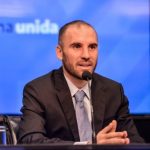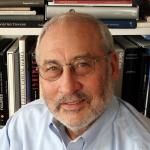INET Global Commission to collaborate with Pope Francis and Scholas Occurrentes on bringing the voices of young people into the economics profession
Vatican May 11, 2019. Pope Francis and American economists Robert Johnson and Joseph Stiglitz pledged to work together with the Pontifical foundation Scholas Occurrentes to develop a series of projects to bring the voices of young people into the economics profession and to also respond to the challenges of growing inequality and despair throughout the world.
In a private meeting with the Pope and Scholas Occurrentes directors José María del Corral and Enrique Palmeyro, Johnson—president of the Institute for New Economic Thinking—and Stiglitz—a recipient of the Nobel Prize in Economics—discussed the need to promote on a global level, a “social economy” that “looks towards the future with the voice of young people in mind”.
During the summit, which served for the signing of a memorandum of understanding between Scholas and INET, Pope Francis and Professor Stiglitz both warned about “the problems of certain forms of market economies that encourage individualistic behavior and in which markets do not end up serving the people but rather the people end up serving the markets.”
“It is fundamental to work on the education of alternative systems that do not worship money. We have to try to develop programs and studies around the concept of a circular economy, that contributes to an education that is aware of the environment’s boundaries and that teaches to return to the environment what is taken from it”, Stiglitz suggested during the meeting. “If not, humanity turns to suicide,” Pope Francis agreed.
At the meeting, which concluded a day of work that had begun at the headquarters of Scholas Occurrentes at the Palace of St. Calisto, Johnson and Stiglitz also proposed to the Foundation to contribute to a series of reports being written by the Commission on Global Economic Transformation (CGET), an initiative of INET with support from the Center for International Governance Innovation (CIGI) and co-chaired by Nobel laureates Joseph Stiglitz and Michael Spence. The CGET is the first commission of its kind, convened at a critical moment for the global economy. As political distrust and xenophobia sweeps the developed world, developing countries search for paths to prosperity, and people around the world struggle with the challenges posed by widening inequality, technological disruption, and climate change. Recognizing the need of new paradigms and new solutions, CGET will chart alternative reforms that will support a more sustainable, prosperous course for the world economy. These ideas will be presented in a series of reports that are currently being drafted and will eventually be discussed at various international economic forums.
“We are deeply interested in working with Scholas to deepen discussions on social issues and the changes generated by globalization in societies, as well as to think about concrete ideas on what we should do to make technology and markets serve humanity and not the other way around,” Stiglitz said. “Society needs a vision of the future that derives from listening intensely and combines the insights of the mind with what is seen through the eye of the heart,” Johnson added. There will be a follow up discussion about the joint projects at the V International Congress organized by Scholas at the University of Fordham in New York, from 2 to 5 June 2019.
On behalf of Scholas, Del Corral and Palmeyro thanked Stiglitz and Johnson for being chosen to represent the youth and give voice to their pains and discontents, and for committing to jointly organize a future meeting in the Vatican between economists and young people from different countries.
During the working day, a select group of economists and researchers from Scholas Chairs, headed by Professor Angelo Paletta, from the University of Bologna, Italy also participated along with members from INET’s Commission on Global Economic Transformation, Peter Bofinger (Professor of Monetary and International Economics at Würzburg University and a member of the German Council of Economic Experts) and Eisuke Sakakibara (Professor of Economics at Keio University and former Japanese Vice Minister of Finance for International Affairs), as well as Columbia University economist Martin Guzman.









